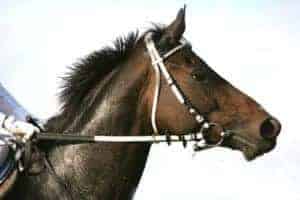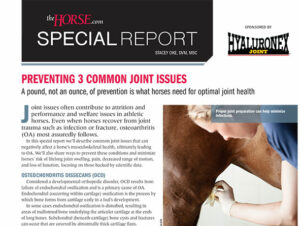
The Bleeding Edge of EIPH in Horses
Learn about recent research on the causes of EIPH, how it affects horses and their performance, and furosemide use in equine athletes.


Learn about recent research on the causes of EIPH, how it affects horses and their performance, and furosemide use in equine athletes.

Learn how to help your horse avoid joint problems such as osteoarthritis, osteochondritis dissecans, and joint flares. Sponsored by Hyaluronex Joint.

A veterinarian describes what causes podotrochlosis and how practitioners diagnose and manage it.

Because the hooves are integral to soundness, veterinarians and farriers should work together to give lame horses the best prognosis.

A veterinarian explains how he uses serum amyloid A to diagnose many equine conditions, plus its limitations.

Find out how to get athletic horses with injuries to the large, complex stifle joint on the road to recovery.

A veterinarian explains the risk factors and recovery process for superficial digital flexor tendon injuries.

Recent study results suggest dietary changes can alter horses’ intestinal microbiome to their benefit.

Horses with equine Cushing’s disease need regular assessments to determine their response to pergolide and adjust dosing as needed.

Researchers are redefining the muscular diseases long called “tying-up.” While they seem similar, the causes are different, and each requires specific management.

West Nile virus is still a threat to horses, but veterinarians say vaccination rates are down.

Navicular syndrome, more accurately referred to as podotrochlosis, is a catchall phrase describing chronic forelimb lameness caused by pain stemming from the navicular bone and related structures. Sponsored by Dechra.

Discover why supportive care and dietary management are paramount for positive outcomes in acute colitis cases.

Water and electrolytes are key to minimizing heat stress and dehydration, and continuous application of 60-78.8 F water is best for cooling.

Keep the horse’s microbiome healthy by mimicking the lifestyle maintained by wild horses.

What causes free fecal water syndrome in horses and how diet plays a part.
Stay on top of the most recent Horse Health news with